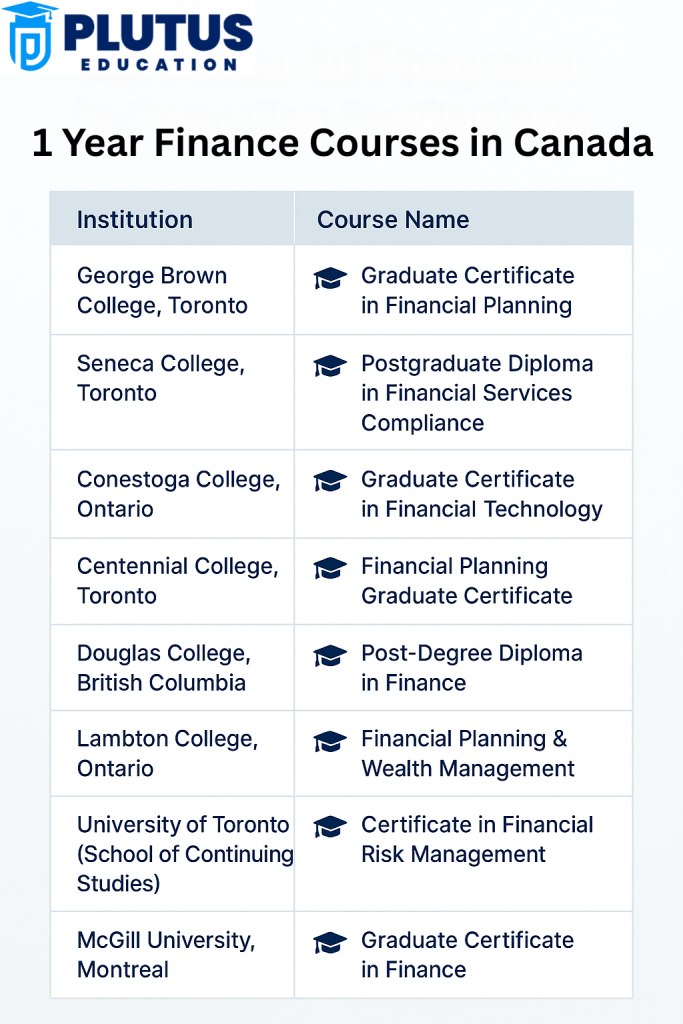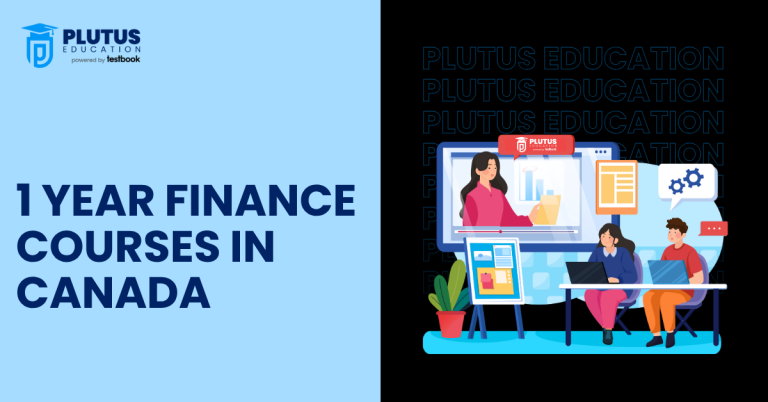You can build a strong career through 1 year finance courses in Canada. These programs let you learn finance fast and well. You attend top Canadian institutes full of expert teachers. You study topics like investment analysis, financial planning, risk management, and corporate finance. You also gain hands-on experience through projects and case studies. You meet students from around the world. You improve your networking skills and grow global awareness. Many courses also help you get internships and work placements. You walk away ready for finance roles in banks, consulting, or corporate finance. You complete the course in just one year. You save time and money compared to longer programs.
Types of 1 Year Finance Courses in Canada
Canada offers different 1 year finance courses in Canada to fit your goals and background. Some focus on practical learning, others on theory or professional subjects. The courses can be diplomas, certificates, or accelerated master’s degrees.
Graduate Certificate in Finance
Graduate certificates teach you important finance skills in a short time. You study budget planning, financial analysis, and decision-making. You often complete projects with Canadian industries and professors. You also gain local work experience through workshops or internships.
Post-Graduate Diploma in Financial Planning
Postgraduate diplomas in financial planning help you become a financial advisor. You learn about personal finance, taxes, retirement, and estate planning. These courses include tools like Excel and financial modeling. You prepare for CFP or other certification.
Accelerated Master of Finance
Some universities offer one-year master’s programs for those with strong undergrad backgrounds. You dive deep into asset management, corporate finance, derivatives, and portfolio theory. You prepare for CFA exams and finance roles. Your coursework includes case studies and group projects.
Professional Development Certificates
You can also take short professional certificates on topics like risk management, treasury, and fintech. These cost less and focus on niche areas. You complete these as standalone credentials or add them to your resume.
| Institution | Course Name | Type | Duration | Eligibility | Key Features |
| George Brown College, Toronto | Graduate Certificate in Financial Planning | Graduate Certificate | 1 Year (2 Semesters) | Bachelor’s degree + IELTS/TOEFL | Prepares for CFP; includes case studies and industry simulation |
| Seneca College, Toronto | Postgraduate Diploma in Financial Services Compliance | Postgraduate Diploma | 1 Year | Bachelor’s degree; finance background preferred | Focus on risk management, compliance, and Canadian financial laws |
| Conestoga College, Ontario | Graduate Certificate in Financial Technology | Graduate Certificate | 1 Year | Degree or diploma in business/IT | Covers fintech, blockchain, and data tools in finance |
| Centennial College, Toronto | Financial Planning Graduate Certificate | Graduate Certificate | 1 Year | Degree in related field | Aligns with CFP; includes real-world financial plan development |
| Douglas College, British Columbia | Post-Degree Diploma in Finance | Post-Degree Diploma | 1 Year | Bachelor’s degree | Focuses on Canadian financial systems, ethics, and analytics |
| Lambton College, Ontario | Financial Planning & Wealth Management | Postgraduate Diploma | 1 Year | Graduate or diploma holder | Combines financial planning, investment and client relationship training |
| University of Toronto (School of Continuing Studies) | Certificate in Financial Risk Management | Professional Certificate | 1 Year (Flexible) | Open to working professionals | Ideal for mid-career professionals focusing on risk and treasury |
| McGill University, Montreal | Graduate Certificate in Finance | Graduate Certificate | 1 Year (Part-time) | Bachelor’s in finance or related field | Courses aligned with CFA curriculum; evening classes available |
Who Should Enroll in 1 Year Finance Courses in Canada?
These courses are open to many types of students. Graduates, working people, and those changing careers can join. You don’t need long experience. You only need a strong interest in finance. You must choose this study path based on your current situation and goals. These programs suit recent graduates, career changers, and skilled professionals.
Recent Graduates
Graduates who hold a bachelor’s in commerce, economics, or business can gain practical finance skills. They can finish in one year and find jobs faster. These programs help them stand out and join banks, fintechs, or consultancies.
Career Changers
Individuals from engineering, arts, or IT who want to enter finance can qualify with a one-year course. They learn fundamentals like financial modeling, accounting, and investment analysis. These courses give them a structured entry into the finance world.
Working Professionals
Experienced professionals in roles like banking, accounting, or project management can update their skills with targeted finance programs. They benefit from flexible formats like evening classes, online modules, or weekend workshops.

Admission Requirements and Application Process
You must meet certain rules to join these courses. You need good grades, test scores, and papers. The steps are simple but need care. Each college has its own process. Applying to 1 year finance courses in Canada involves clear steps. The programs look at your academic background, test scores, essays, and references.
Academic and Test Scores
Most programs ask for a university degree. Finance courses prefer strong grades in commerce, economics, or math. Some courses also need GMAT or GRE scores. English proficiency tests like IELTS or TOEFL are common for non-native speakers. These scores help schools confirm your readiness.
Application Documents
You must prepare several documents. They include transcripts, a resume, two reference letters, and a statement of purpose. You explain why you chose finance, Canada, and this program. You highlight any work internships or projects. You also pay an application fee and track your application online.
Cost, Duration, and Funding
You must plan your money before applying. These courses cost less than long degrees. But you still need to plan for fees and stay. Canada offers some help with costs. Let’s explore tuition, living expenses, and ways to fund your study.
Tuition Fees
Tuition for 1 year finance courses in Canada varies by institution and type. Graduate certificates cost CAD 8,000–15,000. Postgraduate diplomas cost CAD 10,000–18,000. Accelerated master’s cost CAD 20,000–35,000. Professional certs cost CAD 3,000–8,000. The cost depends on the school, location, and curriculum.
Living Expenses
Living costs add rent, food, transport, health insurance, and books. Expect to pay CAD 12,000–18,000 per year outside big cities. In cities like Toronto or Vancouver, you may spend more. Smaller cities like Edmonton or Halifax cost less. You must plan these costs before applying.
Funding Options
You can apply for scholarships or bursaries. Some schools fund international students. The Canadian government gives Canada Student Loans to Canadians. Colleges offer awards for academic merit or financial need. You can also work part-time up to 20 hours per week during study. Some courses support internships or coop programs.
Course Structure and Learning Outcomes
You will study many useful topics in one year. Classes include theory, projects, and group work. You learn real finance tasks. The skills you gain help in jobs. Once you join a 1 year finance course in Canada, you follow a clear course pattern.
Core Subjects Covered
You cover core finance topics such as corporate finance, financial statement analysis, investment management, risk assessment, and financial markets. You also learn financial modeling in Excel. You learn structured products and fintech trends. You work on case studies to solve real industry problems.
Skills You Gain
You gain strong analytical and presentation skills. You learn to evaluate investments and risks. You work in teams. You learn to communicate clearly in English. You develop project planning ability and leadership. You also learn Canadian work norms and business etiquette.
Internship and Work Opportunities
Many colleges offer internships during or after the course. These help you get job experience. You also get a work permit after the course. You can stay and work in Canada. These can be part of your program or sought independently.
Internships and Co-op Placements
Many diploma and master’s programs include a co-op or internship. You spend 3–4 months working in a Canadian company. You gain real-world experience in banking, asset management, or consulting. You apply classroom skills to live projects. You also build local references.
Post-Study Work Permit
Graduates from eligible programs get the Post-Graduation Work Permit (PGWP). PGWP allows working for up to three years after study. This gives you time to gain full-time experience and apply for permanent residence. It also helps you adjust to life in Canada.
Career Outcomes and Salary
You can grow career roles and salary after completing these finance courses. You gain recognition and better opportunities. After the course, many job options open up. You can work in banks, firms, or startups. Pay is good and grows with time. Some roles need more skill. This part shares job types and salary levels.
Job Roles After Graduation
Graduates find roles like financial analyst, investment associate, treasury analyst, risk officer, and finance consultant. Some land in banks, Fintechs, insurance, and consulting firms. Multiple pathways open for promotions and higher roles.
Salary Expectations
Your starting salary may range between CAD 45,000–65,000. With experience and performance, expect CAD 70,000–90,000 in 3–5 years. Senior roles like finance manager, portfolio manager, or senior analyst can pay CAD 100,000+ annually.
Benefits and Challenges
These courses have many good points. But you may face a few hard parts too. Knowing both helps you prepare better. You can plan smart and stay ahead. Studying finance in Canada comes with perks and a few hurdles. Let’s weigh both.
Benefits
Canada offers stable education, multicultural society, and a safe environment. You study in English with a high-quality curriculum. Graduates earn Canadian work experience and global networks. Lower fees than in the US. Flexibility in program formats. Pathways to immigration and PR after work.
Challenges
You will face high living costs in big cities. You may feel homesick and cultural adjustment. You need strong English and academic discipline. Competition for internships can be tight. You will juggle classes, assignments, and part-time work.
How to Choose the Right 1 Year Finance Course?
Choosing the right course depends on your needs and goals. Compare course content, institution reputation, cost, and support services. You must pick the course that fits you. Look at subjects, location, cost, and job help. Each school is different. You must check what they offer.
Course Comparison Checklist
Look for:
- Accredited institution;
- Course topics match your interests;
- Internship or coop support;
- Strong career services;
- Scholarships and financial aid availability;
- Alumni feedback and placement rate;
- Location and campus life.
Use this list to select the best program for you.
1 Year Finance Courses in Canada FAQs
1. What are 1 year finance courses in Canada?
They are diplomas, certificates, or accelerated masters that teach key finance skills in one year.
2. Do employers value 1 year programs?
Yes, employers value certificates with practical training, internships, and project experience.
3. Can I work while studying?
Yes. International students can work up to 20 hours per week during semester and full-time in breaks.
4. Do these courses help with immigration?
Yes. You can get PGWP and apply for PR after gaining work experience.


